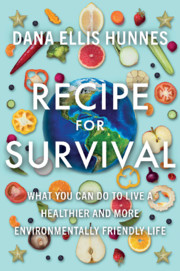Book contents
- Recipe for Survival
- Reviews
- Recipe for Survival
- Copyright page
- Dedication
- Epigraph
- Contents
- Figures
- Tables
- Foreword
- Preface
- Acknowledgments
- Introduction to Part 1
- 1 Agriculture Is a Major Driver of Climate Change (and Disease)
- 2 Politics and Dietary Guidelines
- 3 Overfishing
- 4 Plastic
- 5 Environmental Exploitation
- 6 Species Exploitation for Entertainment
- 7 The Positives
- 8 Part 2: Protecting Earth, One Recipe at a Time – An Introduction
- 9 Epilogue/Conclusion
- Appendix Recipes You Can Use
- Notes
- Bibliography
- Index
5 - Environmental Exploitation
Published online by Cambridge University Press: 06 January 2022
- Recipe for Survival
- Reviews
- Recipe for Survival
- Copyright page
- Dedication
- Epigraph
- Contents
- Figures
- Tables
- Foreword
- Preface
- Acknowledgments
- Introduction to Part 1
- 1 Agriculture Is a Major Driver of Climate Change (and Disease)
- 2 Politics and Dietary Guidelines
- 3 Overfishing
- 4 Plastic
- 5 Environmental Exploitation
- 6 Species Exploitation for Entertainment
- 7 The Positives
- 8 Part 2: Protecting Earth, One Recipe at a Time – An Introduction
- 9 Epilogue/Conclusion
- Appendix Recipes You Can Use
- Notes
- Bibliography
- Index
Summary
We protect species or hasten their extinctions. We protect the environment or destroy it. We slow down the climate crisis or ignore it and hit a point where Earth cannot remain a viable planet. The Convention on International Trade in Endangered Species (CITES) is supposed to protect wild species (over 5,800 animal and 30,000 plant species) from overexploitation and trade. However, it does not seem like CITES protections work. Despite capture and trade bans several species remain endangered and some are critically endangered or at risk of extinction. When humans decide which species to protect or not, corruption (and poaching) often follows. Examples of highly poached and endangered species are provided throughout the chapter including sharks (fins), elephants (tusks), rhinoceros (horns), tigers (bones), giraffes (skins), pangolins (scales), bears (bile), turtles (eggs), and totoabas (bladders) and the incidentally nearly extinct Vaquita. It is predicted we will lose 99.9% of critically endangered and 67% of endangered species within the next 100 years leaving cows as the largest land species on Earth. To retain biological and genetic diversity on Earth, we must stop the trade and exploitation of wildlife now.
Keywords
- Type
- Chapter
- Information
- Recipe for SurvivalWhat You Can Do to Live a Healthier and More Environmentally Friendly Life, pp. 54 - 68Publisher: Cambridge University PressPrint publication year: 2022

